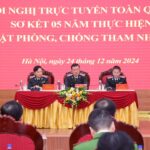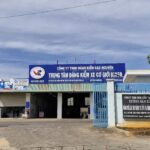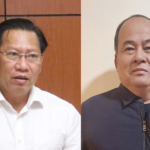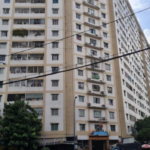According to the Government Inspectorate’s report at the conference, the implementation of the Law on Corruption Prevention and its guiding documents has yielded numerous positive outcomes across various aspects of the work. Ministries, sectors, and localities have focused on inspecting and supervising the implementation of the code of conduct for officials and public employees in performing their duties and public service.
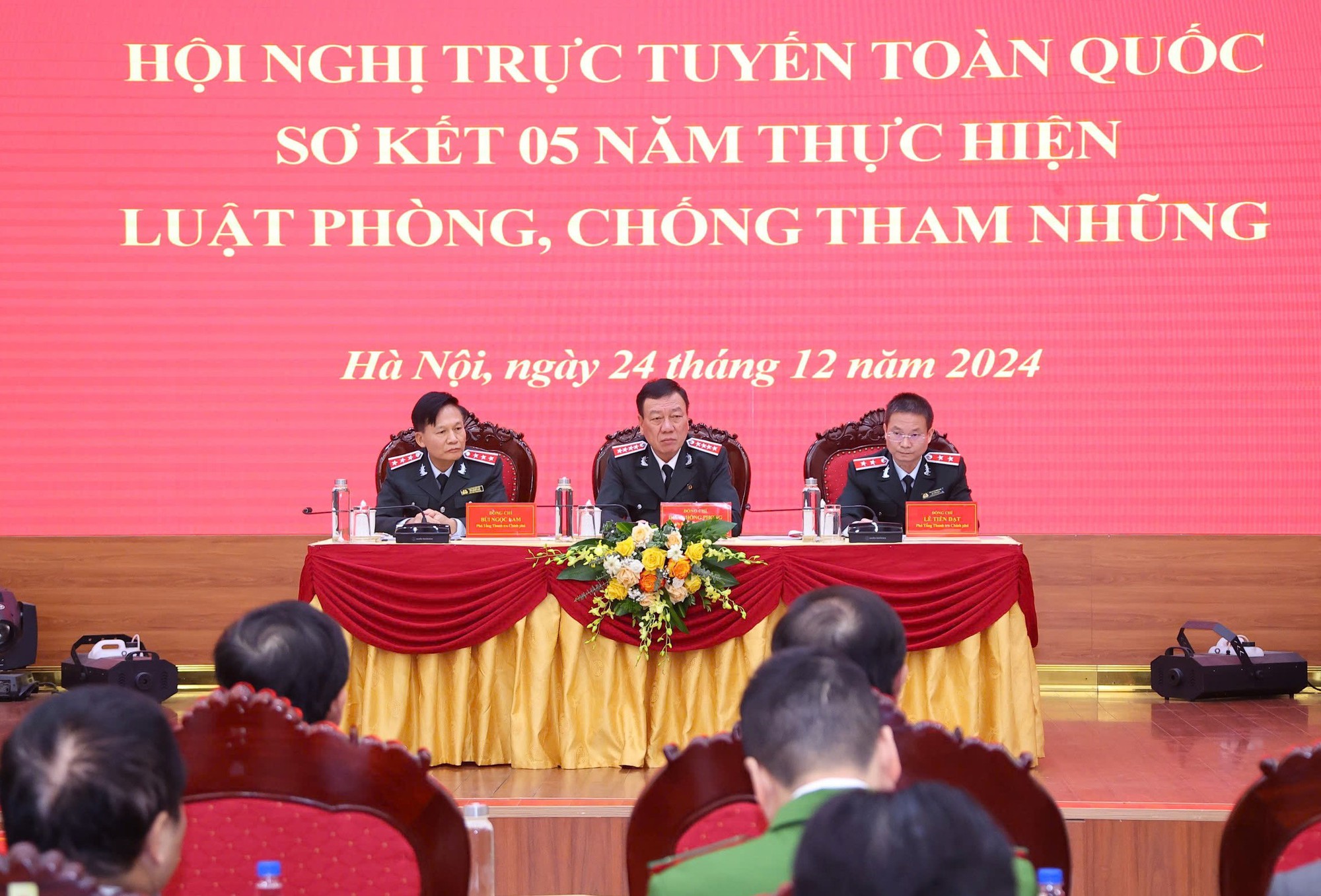
Government Inspectorate organizes a national online conference to review 5 years of implementing the Law on Corruption Prevention. Photo: Government Inspectorate
Along with this, they have organized the rotation of positions for those with authority and power in accordance with the Law on Corruption Prevention and its guiding documents. In the past five years, 235,271 civil servants and public employees have undergone job rotation to prevent corruption.
The inspection of assets and incomes of officials and civil servants has also been properly implemented by ministries, sectors, and localities. From 2020 to 2024, more than 2.06 million people declared their assets and incomes. Of these, 37,106 people had their assets and incomes verified, and as a result, 147 people were disciplined for violating regulations on asset and income control.
According to the Government Inspectorate, ministries, sectors, localities, agencies, organizations, and units have strictly implemented the provisions on the responsibility of heads of agencies in anti-corruption work.
From 2020 to 2024, 264 heads and deputy heads of agencies were disciplined for irresponsibility, allowing corruption to occur; 73 people were criminally handled for the same reason.
Along with the achievements, the Government Inspectorate also pointed out that corruption remains a complex issue with serious nature, involving large amounts of assets and high-ranking officials. The effectiveness of corruption prevention measures remains limited.
The rate of recovery of corrupt assets and losses is still low, while the value of assets to be recovered in corruption and negativity cases remains significant. Legal provisions on handling corrupt individuals are not strong enough and lack deterrence, thus not truly effective in preventing corruption.
At the conference, delegates presented theses and contributed ideas to improve mechanisms and policies in anti-corruption work. Ms. Nguyen Quynh Lien, Head of the Democracy, Supervision, and Appraisal Central Committee, Vietnam Fatherland Front Central Committee, proposed to promote the role of society in corruption prevention.
To achieve this, Ms. Lien suggested that specific regulations are needed to enable the Vietnam Fatherland Front, socio-political, professional, and business organizations, the press, and people to proactively participate, instead of only participating when assigned or invited.
Emphasizing the strong, persistent, and relentless deployment of anti-corruption work, with no restricted areas or exceptions, Inspector General Doan Hong Phong stated that after more than five years of implementing the Law on Corruption Prevention, corruption has been gradually curbed and shows a downward trend.
Before the conference, Mr. Doan Hong Phong mentioned cases that received special attention from public opinion, such as Van Thinh Phat, AIC Company, Phuc Son Group, and Thuan An Group, as evidence of the political determination in anti-corruption work, with no restricted areas or exceptions.
Along with improving mechanisms and policies on anti-corruption, Mr. Doan Hong Phong suggested that the legal corridors on socio-economic management should also be improved to close loopholes and ensure unity and synchronization, preventing individuals from taking advantage of them for corruption and negativity.
According to the Inspector General, inspection, audit, investigation, prosecution, judgment, and enforcement agencies need to pay attention to completing the organization and apparatus and arranging forces to ensure the good performance of anti-corruption work. The inspection agencies should also strengthen the detection and handling of corruption through inspections, especially the timely transfer of cases with criminal signs to investigation agencies.
Inspector General Doan Hong Phong also proposed to promote the role of society in anti-corruption and negativity and to strengthen the supervision of the National Assembly and People’s Councils at all levels in this work.
The Shady Scheme of the Directors: Legalizing Modified Vehicles at the Inspection Center
“A sophisticated scam has come to light, with Luong and Vuong at the center. The duo has been purchasing fake renovation design profiles from various companies, each costing between $200 and $350, to legitimize their renovation completion procedures. This devious scheme underscores their willingness to go to great lengths to cut corners and circumvent the proper channels.”
Indictment Sought for Former An Giang Chairman and Vice-Chairman for Allegedly Taking Bribes from Businesses
According to investigative authorities, Tran Anh Thu, former Vice Chairman of An Giang Provincial People’s Committee, received bribes totaling over 961 million VND. Meanwhile, Nguyen Thanh Binh, former Chairman of the same committee, accepted 300,000 USD as a token of gratitude from a business entity.
The Vinh Phuc Provincial Party Committee Secretary: Inspect and Address Projects Exhibiting Wasteful Tendencies
According to Mr. Duong Van An, Secretary of the Vinh Phuc Provincial Party Committee, the Executive Board of the Provincial Party Committee has unanimously decided to assign the responsibility of leading and directing the inspection and supervision of projects and works with signs of wastefulness in the province to the Provincial Standing Committee. This decision aligns with the direction provided by General Secretary To Lam.

